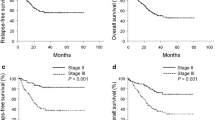Abstract
Background
National guidelines endorse adjuvant chemotherapy ± radiotherapy (C ± RT) for early-stage gastric cancer (ESGC). Compliance with these guidelines and the specific impact of adjuvant C ± RT on overall survival (OS) in ESGC have not been extensively explored.
Methods
The National Cancer Data Base was queried for stage IB-II gastric adenocarcinoma patients undergoing gastrectomy (1998–2011). Multivariable modeling identified factors associated with adjuvant C ± RT receipt and compared risk-adjusted OS by treatment type (i.e., adjuvant therapy versus surgery alone).
Results
Of 23,461 ESGC patients (1998–2011), 79.4 % and 20.6 % received surgery alone and adjuvant C ± RT (chemoradiotherapy 17.7 %; chemotherapy alone 2.9 %), respectively. Predictors of adjuvant C ± RT receipt included age <67 years, pathologic nodal positivity, and adequate lymph node staging (LNS; ≥15 nodes examined; all p < 0.001). Survival analyses included 15,748 patients (1998–2006); median, 1-, and 5-year survival were 63.5 months, 86.0 %, and 27.0 % respectively. Omission of adjuvant C ± RT conferred an increased hazard of risk-adjusted mortality in the overall cohort, and stage IB and II subgroups (all p ≤ 0.001). The benefit of adjuvant C ± RT was most pronounced in stage II and node-positive patients—regardless of LNS adequacy (all p < 0.001)—and inadequately staged IB patients (p = 0.003). While associated with a trend toward improved OS in node-negative patients overall (p = 0.051), adjuvant C ± RT did not improve OS if surgical LNS was adequate in this subgroup (p = 0.960).
Conclusions
Adoption of adjuvant C ± RT in ESGC remains incomplete nationally. Receipt of adjuvant therapy is associated with improved risk-adjusted survival relative to surgery alone; however, in adequately staged patients without lymph node metastasis, this benefit is less certain.



Similar content being viewed by others
References
National Cancer Institute. SEER Cancer Statistics Factsheets: Stomach Cancer. NCI, Bethesda, MD. http://seer.cancer.gov/statfacts/html/stomach.html. Accessed 5 June 2015.
Hundahl SA, Phillips JL, Menck HR. The National Cancer Data Base Report on poor survival of U.S. gastric carcinoma patients treated with gastrectomy: Fifth Edition American Joint Committee on Cancer staging, proximal disease, and the “different disease” hypothesis. Cancer. 2000;88(4):921–32.
Macdonald JS, Smalley SR, Benedetti J, et al. Chemoradiotherapy after surgery compared with surgery alone for adenocarcinoma of the stomach or gastroesophageal junction. N Engl J Med. 2001;345(10):725–30.
Cunningham D, Allum WH, Stenning SP, et al. Perioperative chemotherapy versus surgery alone for resectable gastroesophageal cancer. N Engl J Med. 2006;355(1):11–20.
Coburn NG, Guller U, Baxter NN, et al. Adjuvant therapy for resected gastric cancer: rapid, yet incomplete adoption following results of intergroup 0116 trial. Int J Radiat Oncol Biol Phys. 2008;70(4):1073–80.
Kozak KR, Moody JS. The survival impact of the intergroup 0116 trial on patients with gastric cancer. Int J Radiat Oncol Biol Phys. 2008;72(2):517–21.
Enestvedt CK, Diggs BS, Shipley DK, Thomas CR, Billingsley KG. A population-based analysis of surgical and adjuvant therapy for resected gastric cancer: are patients receiving appropriate treatment following publication of the intergroup 0116 results? Gastrointest Cancer Res. 2009;3(6):233–8.
Ejaz A, Spolverato G, Kim Y, et al. Impact of external-beam radiation therapy on outcomes among patients with resected gastric cancer: a multi-institutional analysis. Ann Surg Oncol. 2014;21(11):3412–21.
Ajani JA, Bentrem DJ, Besh S, et al. Gastric cancer, version 2.2013: featured updates to the NCCN Guidelines. J Natl Compr Cancer Netw. 2013;11(5):531–46.
Snyder RA, Penson DF, Ni S, Koyama T, Merchant NB. Trends in the use of evidence-based therapy for resectable gastric cancer. J Surg Oncol. 2014;110(3):285–90.
Datta J, McMillan MT, Shang EK, et al. Omission of adjuvant therapy after gastric cancer resection: development of a validated risk model. J Natl Compr Cancer Netw. 2015;13(5):531–41.
Bilimoria KY, Stewart AK, Winchester DP, Ko CY. The National Cancer Data Base: a powerful initiative to improve cancer care in the United States. Ann Surg Oncol. 2008;15(3):683–90.
Fritz AG, Colton SW Jr. Memorial Fund. International classification of diseases for oncology: ICD-O. 3rd ed. Geneva: World Health Organization; 2000
Datta J, Lewis RS Jr, Mamtani R, et al. Implications of inadequate lymph node staging in resectable gastric cancer: a contemporary analysis using the National Cancer Data Base. Cancer. 2014;120(18):2855–65.
Datta J, McMillan MT, Ecker BL, et al. Implications of lymph node staging on selection of Adjuvant therapy for gastric cancer in the United States: a propensity score-matched analysis. Ann Surg.2015;263(2): 298–305.
Lowenfeld L, Datta J, Lewis RS Jr, et al. Multimodality treatment of T4 gastric cancer in the United States: utilization trends and impact on survival. Ann Surg Oncol. 2015;22(3): 863–872.
McMillan MT, Ojerholm E, Roses RE, et al. Adjuvant radiation therapy treatment time impacts overall survival in gastric cancer. Int J Radiat Oncol Biol Phys. 2015;21(2):326–336.
Smalley SR, Benedetti JK, Haller DG, et al. Updated analysis of SWOG-directed intergroup study 0116: a phase III trial of adjuvant radiochemotherapy versus observation after curative gastric cancer resection. J Clin Oncol. 2012;30(19):2327–33.
Coburn NG, Swallow CJ, Kiss A, Law C. Significant regional variation in adequacy of lymph node assessment and survival in gastric cancer. Cancer. 2006;107(9):2143–51.
Acknowledgment
None.
Disclosures
None.
Author information
Authors and Affiliations
Corresponding author
Additional information
Jashodeep Datta and Matthew T. McMillan have contributed equally to this manuscript.
Matthew T. McMillan is co first-author.
Electronic supplementary material
Below is the link to the electronic supplementary material.
Rights and permissions
About this article
Cite this article
Datta, J., McMillan, M.T., Ruffolo, L. et al. Multimodality Therapy Improves Survival in Resected Early Stage Gastric Cancer in the United States. Ann Surg Oncol 23, 2936–2945 (2016). https://doi.org/10.1245/s10434-016-5224-1
Received:
Published:
Issue Date:
DOI: https://doi.org/10.1245/s10434-016-5224-1




